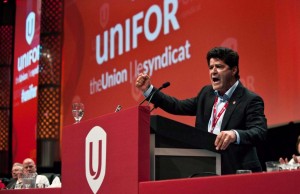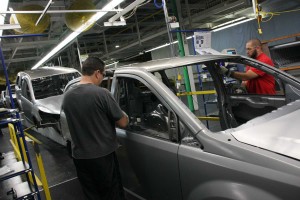
Unifor President Jerry Dias is demanding additional investment in Canada during this set of contract talks.
The curtain is going up this week on the formal contract talks between Unifor, the union that now represents Detroit’s auto workers and the Detroit three automakers in Canada.
“These are perhaps the most important auto contract talks in a generation,” said Unifor National President Jerry Dias, who will lead the negotiations, covering some 23,000 workers in the province of Ontario.
“There will be no deals with any of the companies without commitments from each of them for investments in Canada,” he added in a statement released prior to the opening of the talks with General Motors, Ford Motor Co. and Fiat Chrysler Automobiles N.V.
Talks start first with General Motors today, followed by formal openings with Ford and Fiat Chrysler Canada on tomorrow.
Dias said Unifor will follow its tradition of pattern bargaining. With pattern bargaining, negotiations focus on one company, establishing a pattern that will model the contracts of with the other automakers. Once a deal is ratified with the pattern target, focus shifts to the next company, and then the third.
“This system has served both the companies and the workers well, ensuring we don’t have a race to the bottom and can maintain good jobs and strong communities,” said Local 200 President Chris Taylor, chair of the Master Bargaining Committee.

Fiat Chrysler's Windsor, Ontario, plant that builds the Chrysler Town & Country and Dodge Caravan is home to the Chrysler Pacifica.
(GM adds 700 engineers in Canada. For more, Click Here.)
At its meeting June 1, Unifor’s Auto Council, with elected representatives from every bargaining unit involved in this round of talks, voted unanimously to make new investments in Canada, including new product allocations, the top priority of the talks.
Dias said while the top priority will be new product, workers helped the companies weather the financial storm of 2008-09, and deserve to reap the rewards – just as shareholders and top executives have done during the last few years.
“The automakers’ relative health and the strength of the North American auto market make now the ideal time to invest,” Dias said.
Contracts with the Detroit Three companies expire at 11:59 p.m. on Sept. 19, putting the two sides in a legal strike/lockout position at that time.
(Click Here for details about the UAW securing promises from Hillary Clinton.)
Unifor is Canada’s largest union in the private sector, representing more than 310,000 workers, including more than 40,000 in the auto industry, 23,000 employed by the Detroit Three. It was formed Labor Day weekend 2013 when the Canadian Auto Workers and the Communications, Energy and Paperworkers union merged.
Detroit’s carmakers have been relatively quiet in the run-up to the negotiations. But the Canadian Auto industry has been steadily shrinking for the past decade as carmakers have shifted more production to Mexico. Roughly 25% of the vehicles assembled in North America were assembled in Canada prior to the industry financial crisis in 2008.
Only about 15% of the vehicles built in North America currently, according to figures supplied by Unifor.
(To see more about a woman parking her Mercedes … on a Ferrari 458, Click Here.)
The shrinking of the production base has also has led to a reduction in automotive suppliers in Ontario. Manufacturers are also concerned about cost of utilities and logistics as well as the fluctuating value of the Canadian dollar.
